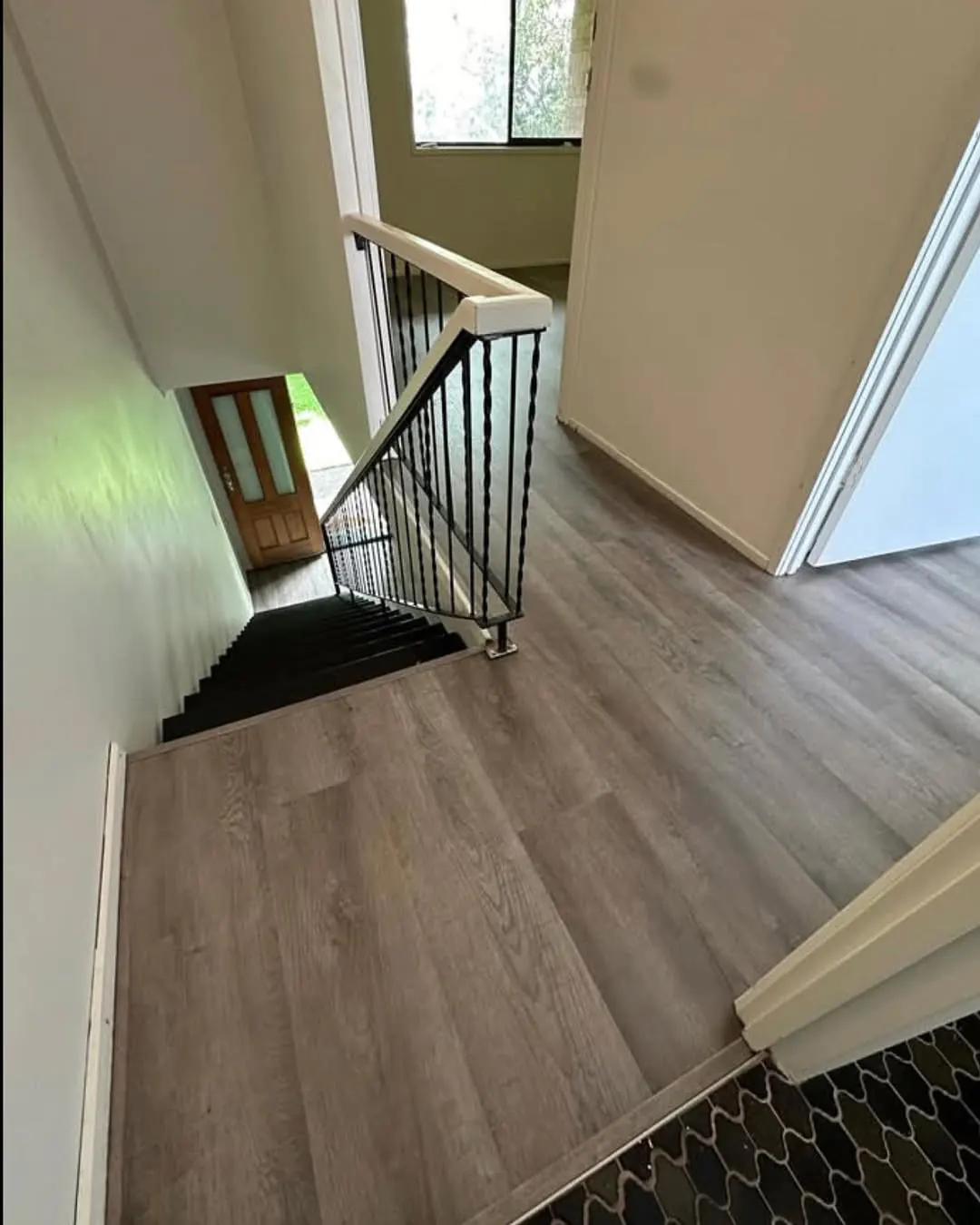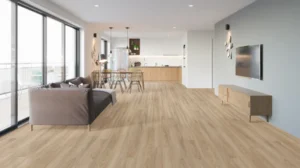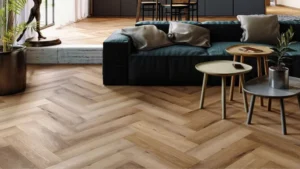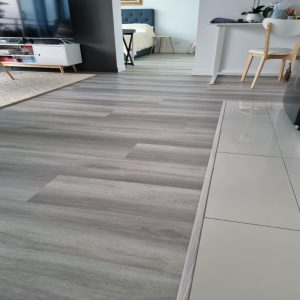
You may have stumbled upon the terms “SPC” and “WPC” when searching for commercial or residential hybrid flooring. Many Australian homeowners remain confused by the SPC vs WPC hybrid flooring debate, so we’re here to help.
SPC and WPC are two versions of rigid-core vinyl flooring. Industry experts also refer to them as hybrid flooring because they combine the advantages of vinyl and rigid-core assembly..
Choosing between the two floor types can be confusing and challenging because both are 100% waterproof. However, SPC hit store shelves later and features a resilient, indestructible core that many homeowners love. It is advisable to put he SPC vs hybrid flooring issue to rest because the former is a broader part of this floor type.
Conversely, WPC sets the bar high for vinyl flooring and features a waterproof, cosy, and functional core that captures the attention of savvy consumers.
This blog will explain the advantages and disadvantages of SPC and WPC hybrid flooring, the manufacturing process, cost, durability, and comfort to help consumers make sound, long-term decisions that result in a stunning home or commercial environment.
Key Takeaways
- SPC and WPC are two types of hybrid flooring combining vinyl with a rigid core to offer performance and waterproofing.
- SPC flooring has a very rigid, dense core, providing exceptional durability and resistance to dents, impacts, and heavy use.
- WPC flooring has a wood‑plastic core with a foaming agent, making it softer, more comfortable, and cushioned underfoot.
- Both SPC and WPC are 100% waterproof, suitable for moisture‑prone rooms like kitchens and bathrooms.
- SPC is more durable and ideal for high‑traffic or commercial spaces, resisting heavy loads and frequent use.
- WPC offers a warmer, more comfortable feel, making it favourable for residential living areas where comfort matters.
- SPC tends to be more affordable than WPC while still delivering strong performance benefits.
What Is SPC Hybrid Flooring?
SPC, or rigid core luxury vinyl flooring, is a type of hybrid floor that means “stone plastic composite” or “stone polymer composite,” referring to the core’s components. This floor’s sturdy core is among its most significant selling points and provides Australian homeowners with a sense of security. Whether your residence has an even or uneven subfloor, SPC flooring will remain durable for a long time.
SPCs are the most resilient waterproof hybrid flooring alternative on the market. You can assemble this flooring on rigid surfaces or subfloors, regardless of foot traffic amount.
Don’t let the SPC flooring vs hybrid flooring issue confuse you. SPC and WPC are part of the broader hybrid flooring category.
SPC Hybrid Flooring Layers
Conventional wisdom dictates that thicker vinyl flooring is the best long-term solution for your living space. However, with the development of rigid core vinyl, thickness has become obsolete.
Modern technology has created ultra-thin, rigid-core luxury vinyl planks and tiles with no more than 6 mm thickness.
At first glance, the flooring looks flimsy, thin, or fragile. As trusted hybrid flooring Sydney experts, we encourage homeowners not to take things at face value because bending this resilient floor is an exercise in futility.
SPC hybrid flooring’s four-layered construction is the reason behind its resilience. Please remember that the number of layers varies among manufacturers. However, four layers remain the standard. These include the following:
- Backing layer: This layer serves as your flooring’s sturdy foundation. Manufacturers often construct the backing layer with a pre-attached underlayment that enhances its structural integrity.
- SPC core: This sturdy, waterproof core doesn’t expand or ripple regardless of water moisture levels. Although its SPC core’s ultra-dense construction makes the underfoot sensation less soft, it also makes the flooring more resilient.
- Printed vinyl layer: This layer contains realistic images that mimic genuine stone and wood, making your living space look stunning.
- Wear layer: This layer shields your plank from wear and tear, strengthens it, and increases its lifespan. We recommend purchasing SPC hybrid flooring with thick wear layers that guarantee heavy-duty protection.
Advantages of SPC Hybrid Flooring
SPC hybrid or rigid core vinyl flooring has several unique advantages, including the following:
- Water-resistant: SPC hybrid flooring’s water-resistant features prevent excessive moisture accumulation, compromising structural integrity. Whether you’re a homeowner, pet owner, or entrepreneur living in a water-prone area, you will enjoy valuable peace of mind.
- Uneven subfloor compatibility: Manufacturers designed and created rigid core vinyl flooring to suit any hard surface, including uneven subfloors, providing homeowners relief and reassurance.
- Robust: Thanks to its ultra-dense SPC core assembly, rigid core vinyl is the most resilient flooring alternative on the market today.
- Stunning aesthetics: High-quality SPC floors closely mimic genuine wood and stone, making the visuals eye-catching and significantly improving your indoor aesthetics.
- Low maintenance: Cleaning and maintaining rigid core vinyl floors only requires occasional mopping and vacuuming.
- Easy assembly: Because of its click-lock mechanism, homeowners can easily assemble SPC hybrid flooring without nails or adhesives, making it a convenient alternative for your living space.
Disadvantages of SPC Hybrid Flooring
Here are the disadvantages of SPC hybrid flooring:
- Comfort: Durability is the primary consideration of manufacturers when creating SPC hybrid flooring. Hence, it’s not as comfortable as other flooring alternatives.
- Poor heat retention: Since the core of SPC hybrid floors doesn’t retain significant heat, your floor will feel chilly during the Australian winter months from June to August.
- Noise: Rigid-core vinyl flooring can be noisier than other alternatives, so this factor must be considered if you reside in a flat or shared building.
- Environmental impact: Since SPC hybrid floors are manufactured from PVC and contain formaldehyde, they are not the most eco-friendly option on the market.
- Cost: Rigid core vinyl flooring is more expensive than other luxury vinyl floor alternatives.
What Is WPC Hybrid Flooring?
Wood plastic composite (WPC) flooring is made from 100% waterproof wood pulp and plastic core with a foaming agent for added softness and comfort. Hence, WPC is ideal for settings where people stand up frequently, such as living rooms or kitchens.
WPC floors are popular among Australian homeowners because they mimic genuine hardwood and require little maintenance and upkeep. Entrepreneurs love this flooring alternative because of its aesthetic appeal and easy installation features.
WPC Hybrid Flooring Layers
Similar to rigid core vinyl flooring, the WPC version also has four layers, including the following:
- Wear layer: This protective layer shields the floor’s surface from daily wear and tear, especially in high-traffic areas. We strongly recommend considering WPC hybrid flooring with thicker wear layers for increased endurance and longevity.
- Printed vinyl layer: This layer contains eye-catching images that mimic genuine wood or stone, livening up your indoor space.
- WPC core: WPC floors have a waterproof core that repels moisture and prevents swelling, staining, and warping. This core extends lifespan and gives homeowners a solid return on their investment.
- Backing layer: This bottom layer serves as the floor’s sturdy foundation. Some manufacturers attach an underlayment to enhance convenience.
What Are The Advantages of WPC Hybrid Flooring?
The advantages of WPC hybrid flooring include the following:
- 100% water-resistant: The entire structure of WPC hybrid flooring is entirely water-resistant, helping to resist moisture and prevent water damage.
- Comfortable: WPC hybrid floors have a foamed core that softens and cushions the entire structure, significantly enhancing user comfort. Thus, this flooring type is ideal for areas where people stand up frequently, including kitchens, bars, and living rooms.
- Stylish: High-end vinyl flooring accurately mimics real wood or stone, resulting in stylish, stunning aesthetics that last over time.
- Easy assembly: WPC hybrid flooring’s convenient click-and-lock systems make it easy for homeowners to install, saving time and enhancing convenience.
- Low maintenance: Cleaning and maintaining WPC hybrid floors require only occasional sweeping and mopping.
- Positive environmental impact: Unlike rigid core vinyl hybrid flooring, the WPC version uses recycled materials, lowers virgin wood demand, and leaves a positive environmental impact.
What Are The Disadvantages of WPC Hybrid Flooring?
Here are the disadvantages of WPC hybrid flooring:
- Denting susceptibility: WPC hybrid flooring is less durable than its SPC version. Although the former’s core is softer and more comfortable, the likelihood of denting increases significantly whenever heavy items drop on the floor.
- Discolouration: WPC hybrid flooring with light or natural wood finishes tends to discolour over time when exposed to harsh sunlight. UV radiation degrades the flooring’s plastic components and fades their colours.
- Warping: The plastic components of WPC hybrid floors expand and contract when temperatures fluctuate, leading to cracking or warping.
- Cost: Although WPC hybrid floors are slightly more expensive than SPC, Australian manufacturers are creating more cost-effective versions of the former. Nevertheless, WPC hybrid floors are more affordable than traditional solid hardwood ones.
How Do SPC and WPC Hybrid Floors Differ?
SPC and WPC hybrid floorings differ in their core construction. Although both cores are waterproof, manufacturers derive the WPC’s version from wood-plastic composite and include a foaming agent to increase durability and comfort.
Conversely, rigid core luxury vinyl flooring is made of stone-plastic composite. The absence of a foaming agent results in a strong, sturdy core that resists denting. Hence, SPC floors are ideal for living spaces with heavy furniture. A stout, indestructible core also makes SPC hybrid flooring an excellent choice for high-traffic areas.
WPC is a deluxe, high-end home carpet compared to other hybrid flooring types. On the other hand, SPC’s extra-resilient core makes it ideal for commercial use. Since the former is more comfortable while the latter is sturdier, we encourage users to purchase the option that best suits their unique preferences.
SPC and WPC Hybrid Floors: A Tale of The Tape
Comparing the various facets of SPC and WPC hybrid flooring will help people make informed long-term decisions and get significant investment returns.
Cost
Although WPC is more expensive than other hybrid floorings, its benefits make your purchase worth every cent. You get 100% waterproof, stylish, and cosy flooring that takes your aesthetics to the next level.
However, SPC has similar advantages with a cheaper price tag, making it more appealing to Australian homeowners and entrepreneurs. Price-wise, SPC hybrid flooring has the edge over WPC.
Feel
SPC’s durable, rigid stone composite core appeals to many Australian consumers. Unfortunately, its stiffness results in an uncomfortable feel.
Since WPC has a less rigid core, it feels more comfortable underfoot. This hybrid flooring type also retains heat, which is beneficial during the Australian winter from June to August. Overall, WPC is more comfortable than SPC.
Use
SPC and WPC hybrid floorings work well in basements, bathrooms, kitchens, and various home floors. Many homeowners prefer WPC because it’s more comfortable than its SPC counterpart.
Conversely, entrepreneurs love SPC’s rigid core, which is perfect for their high-traffic commercial spaces. SPC gets a slight edge in this facet.
Durability
Both alternatives are durable. However, SPC, or rigid core luxury vinyl flooring, is the most resilient in the industry. Since high-level traffic or heavy furniture cannot dent SPC floors, they’re better and more durable than HPC.
Moisture Resistance
Excess moisture can compromise your floor’s structural integrity and cause severe damage over time. Fortunately, both SPC and WPC are 100% water-resistant. Regardless of your choice, no water will seep into the planks and wreak havoc on your floors.
Assembly
SPC and WPC hybrid flooring have easy-to-install, click-and-lock systems that help DIY homeowners save time and effort. Assembly is a breeze whether you prefer SPC or WPC.
Our Most Popular Herringbone Hybrid Flooring Styles
Be sure to view the most popular herringbone hybrid flooring styles among our customers:
- Natural Oak Herringbone Hybrid Flooring
- Blackbutt Herringbone Hybrid Flooring
- Hamptons White Herringbone Hybrid Flooring
Conclusion
All things considered, neither SPC nor WPC hybrid flooring is better than the other. Your preference will hinge on several factors, including cost, location, durability, installation, and long-term use. As trusted, reliable hybrid flooring Brisbane experts, we encourage you to determine your unique needs before making an informed decision.
Ezy Decking is a leading supplier of premium quality 100% waterproof hybrid flooring to the Gold Coast, Brisbane, Sydney & Australia-wide. Contact us today for professional advice on choosing the best flooring solution for your requirements.
Related Articles

Why Hybrid Flooring is a Smart Choice for Homes in 2026
Hybrid flooring’s eye-catching design and durable laminate and vinyl material resonate deeply with many Australian homeowners. Since many clients prefer…

How Herringbone Hybrid Flooring Can Make Rooms Feel Larger
Whether you’re building a new home or renovating an existing one, herringbone hybrid flooring is a timeless indoor fixture that…

Key Colour Considerations to Make When Choosing Hybrid Flooring
Choosing the appropriate hybrid flooring colour complements each room’s visual appeal and enhances long-term property value, transforming your home into…





